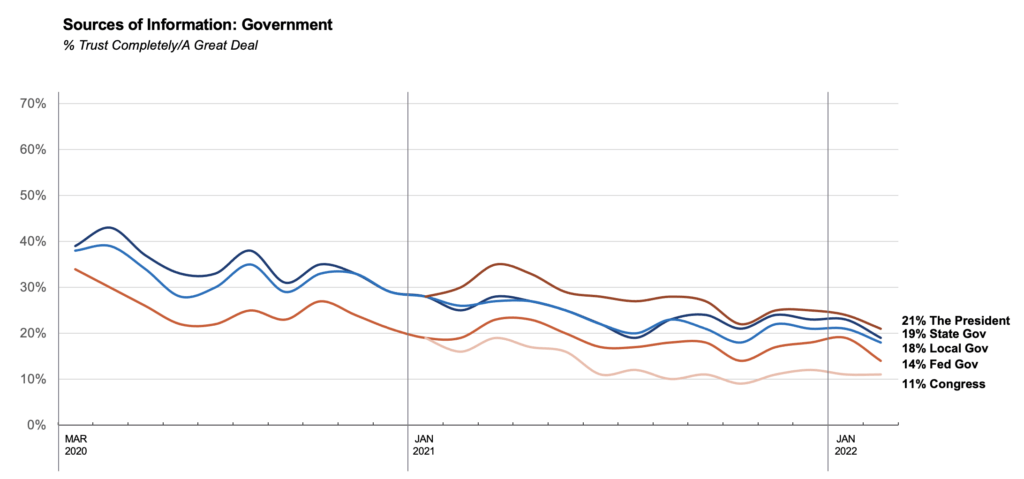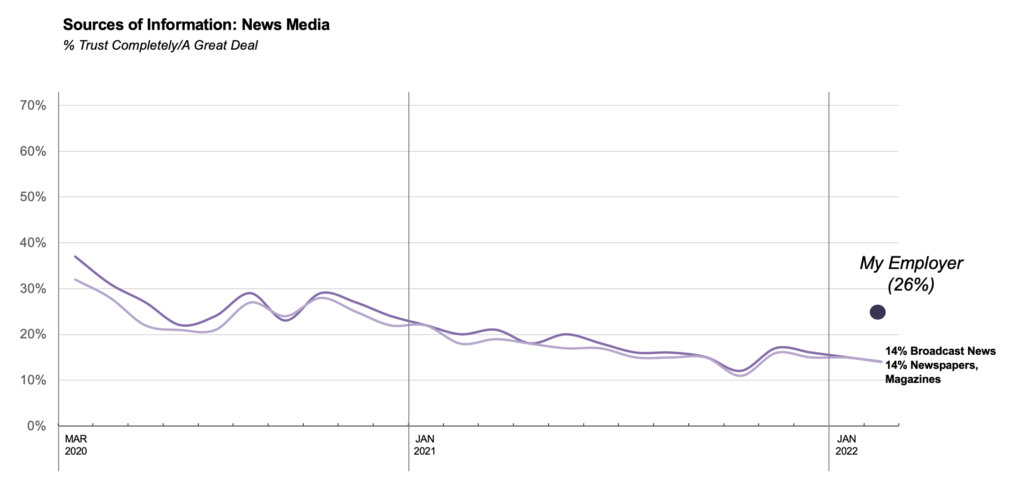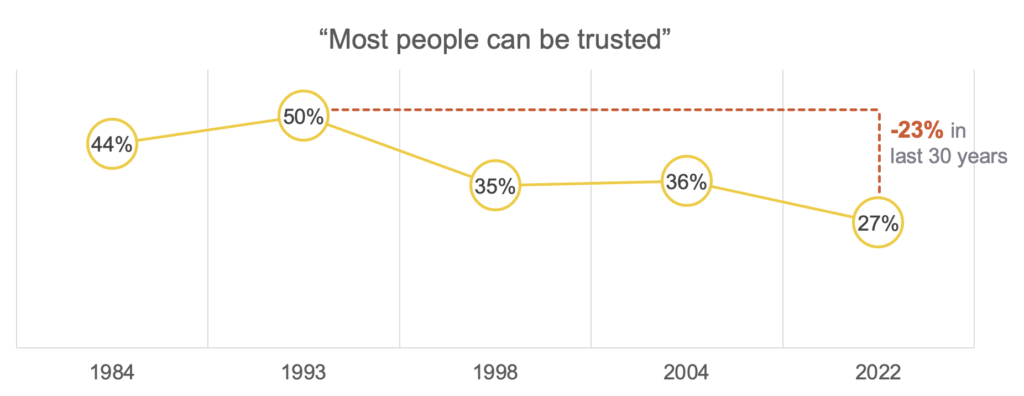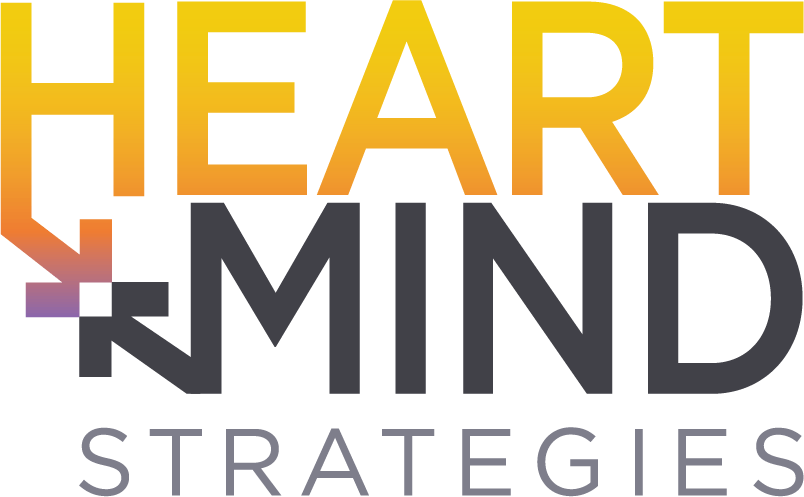In our February Connections session, “Doing Business in a Post-Truth World”, we jumped into the complexity of how society today operates in a cloud of cynicism and tribal alignment on facts and information. We benefited from a multi-national perspective on truth and credibility with guest speakers Dylan Buffinton with The Salmon Consulting in France, Saif Khattak with Tabadlab in Pakistan, and Bob Bailey with the Truth Collective in the US.
The discussion landed us at collective agreement that principles of stakeholder capitalism and servant leadership may be the most effective path for businesses to reframe trust and credibility in a disillusioned time. The ideas shared offer inspiring guidance on complex issues.
The Problem? Cynicism and Distrust in an Increasingly Tribal Environment
Our latest Pulse survey shows a continued decline in trust in information sources that is cause for concern. Maury Giles, Heart+Mind Strategies Chief Growth Officer, highlighted a trend of cynicism toward institutional information sources (government and news media) that has reached a critical point. Trust of information from the government has dropped dramatically (US President 21%, Federal Government 14%, and Congress 11%), while trust for “watchdog” institutions in the news media is now just as bad (from 40% to 14% in two years). Interestingly, trust in the private sector has stayed steady and is now higher than trust in these traditional institutions.


“How do you operate in an environment when the reliance on credible information–which is central and requisite to a free market system and productive interaction within society–and trusted information is so tribally driven?”
Maury Giles, Heart+Mind Strategies
Lacking an information source in which most of us trust, it is not surprising that most people today reject “data” or “facts” that do not align with their political views. Only 14% of conservatives say in the last year they’ve found information from a liberal-leaning news story to be factual even though they disagreed with it (only 12% of Trump voters). Only 18% of liberals and moderates say the same about information in conservative-leaning stories (19% of Biden voters). We believe what we already believe.
Of even greater concern, we are also less trusting of each other. Today only 27% of Americans say that “most people can be trusted” – this is down from 50% in 1993, a 23-point drop over 29 years. [Source: World Values Survey]

Social Media Changes Our Language and Pursuit of “Truth”
Social media has contributed to a shift in information sharing behavior and the specific language we use that is redefining truth and trust.
Saif Khattak (working with Tabadlab in Pakistan) observed that from the 1980s our vocabulary has evolved directly correlated with the exponential rise in social media. The shift has been from rational to emotive words (e.g., “I am certain” is now “I feel”). Khattak argues this shift also leaves more room for subjectivity in language. More compelling is the shift away from collective words (e.g., “ours”, “theirs”) to individual and notably more self-interest driven language.
“There’s a shift from rationality to emotionality and then there’s a shift from collectiveness to individualness. And I feel that this individuality and emotion, or a shift towards from rationality to emotional, directly manifests the post-truth age that we are living right now.”
Saif Khattak, Tabadlab
Bob Bailey applied this trend to our information-seeking behavior today of seeking “truth” that supports personal beliefs.
“The results are we seek confirmation versus seeking new ideas and perspectives, binary thought patterns that lead to binary predictable actions, people outsourcing their identities to political ideologies.”
Bob Bailey, Truth Collective
The net result of these patterns is a lack of a shared sense of “truth” on a growing number of issues, questions, and ideas we pursue in daily life.
Fragmentation of Truth
Our individual perceptions of trust and truth are shaped by life experience and perceived sense of control over future opportunity.
Our recent Pulse data shows that the rising generation trusts each other even less than older generations (compare Boomers at 38% “most people can be trusted” vs. only 20% of Gen Z). We find similar dynamics by socioeconomic status; those with fewer resources trust each other at much lower levels than those with more (43% among those with $100K+ and only 21% among those with less than $50K).
Recent work at Heart+Mind revealed younger people and those with fewer resources struggle with hope and optimism for their future. The Americana ideal of “pursuit of happiness” is not experienced the same way by all groups, which leads to conflict and cynicism that cuts both directions between the “haves” and “have-nots”.
Dylan Buffinton (working with The Salmon Consulting in France) explained, “We’re living in a society where there’s fragmentation of realities … of truth.” He sees this happening in France as much as he’s seen or read about in the US.
“Each one is in their own little pathway, never discussed. And maybe even worse than never discussed because people have been disagreeing for years. More and more, people believe that people who don’t agree with them, if they disappeared, life would be better. You almost want to erase and think that your life would be easier and better if you didn’t have the people that didn’t agree with you.”
Dylan Buffinton, The Salmon Consulting
Khattak noted this dynamic in his native Pakistan with his own views, an evolution with both positive and negative outcomes.
“With globalization and with the rise of social media, what has happened is that I have become more familiar with other cultures. That has made me question my version of the truth. Perhaps that same process is replicating elsewhere as well. And these are different manifestations of it.”
Saif Khattak, Tabadlab
Bailey put it more succinctly, “The notion of ‘THE truth’ has become the notion of ‘MY truth’.”
This individual definition of, and reliance upon, truth presents a challenge to society on multiple fronts.
“It’s really a democratic and a future problem we might have. If you look at the financial world…our capitalist consumption society needs peace, needs calm to thrive. It’s going to be very difficult if everybody starts really being in their own little channel and not listening to the other, to sell your products, to grow, and to try to really expand your business.”
Dylan Buffinton, The Salmon Consulting
Opportunity for Business
Business also contributes to this trend when practicing what Buffinton refers to as the “Pitch Economy”, overpromising and “loosening the relationship with truth” to condition people to not trust or rely on what you say or commit to doing. This approach is short-lived.
Bailey challenges businesses to align to a higher order embraced in stakeholder capitalism.
“How do businesses and brands continue to thrive amongst this post-truth, all this chaos? I really think it comes down to how we all answer this following question: is the world better off because my business is in it? And the answer had really better be a hell yes.”
Bob Bailey, Truth Collective
RELATED: 10 Ways Businesses Can Take the Lead
Buffinton agreed but suggested organizations need to be narrow in their focus to tackle achievable objectives, and they should be collaborative in their efforts with a focus beyond shareholder value.
“The whole question is, how can you open up? How can you open up with suppliers, even with your competitors? I think a great example is companies who manage to take one challenge and say, ‘Let’s all get around the table, stop thinking about market shares, and let’s take a fight together.’ That’s a great opportunity.”
Dylan Buffinton, The Salmon Consulting
Marketers need to resist the trap of taking advantage of division in society for short term gains. At the same time, leaders should avoid assuming overly authoritative stances that leave no room for alternative perspectives. Both practices erode, rather than build, trust.
Once aligning on purpose, being open and collaborative, structure and incentives need to align with intent: mission, objectives, KPIs, compensation structures, etc. Bailey noted these efforts mean leaders have to work to “eradicate fear” within their organizations to get everyone working toward “something bigger”.
Movement in this direction becomes a more direct manifestation of servant leadership in which self-interest is not the driving force. Trust builds when actions toward this direction align with the story that is being told.
“We all talk about storytelling, right? And that’s a really important aspect of what we do, expressing a brand’s purpose or expressing their truth through stories and engaging ways. But I think we can’t stop there. I think we have to proceed to story showing. I think it is more about the doing, the actions, and find ways that brands can live their purpose well beyond ads and story arcs.”
Bob Bailey, Truth Collective
Bailey and Buffinton shared examples of Herschend Family Entertainment offering higher education benefits for its entire workforce, and the French company The Consumer Brand that revolutionized the grocery industry by putting the consumer in charge.
Ultimately, business has the opportunity to choose to connect with people in a meaningful way with the intent of building, not solely winning.
“I tell all of my people this on a regular basis. I say, ‘You know what? We have to trust fast.’ I say, ‘We have to trust each other fast. If we are going to achieve great things, we need to be able to trust each other.’ And that means we have to listen and it means we have to entertain perspectives.”
Bob Bailey, Truth Collective
Takeaways/Conclusions
When a global society is experiencing an ongoing crisis, it is essential to reflect on other national perspectives to discuss the critical issue of trust and information. We have learned that creating and maintaining trust takes vulnerability, openness, and time.
Trust is a formula that’s credibility + reliability + intimacy (or what I know about you and how well we know each other) divided by self-interest. And so, it’s a bit of a delicate situation.
Bob Bailey, Truth Collective
We offer the following guidance in this time of fragmented truth and eroding trust:
- Make the choice to commit to be real
- Align structure, incentives, KPIs to your purpose
- Practice what you preach, do what you say, live what you promise
- As a business ask yourself, is the world better off because my business is in it?
- Partner with communities to understand your business’ place within that community
- Engage multiple perspectives
- Share the steps and strategy your business is taking to address issues facing your consumers and take on initiatives within your domain and that you are able to effect
- Avoid the traps of capitalizing on short-term division AND pursuing an overly-exclusive path
Watch the full Connections session below. You can hear us discuss the role of businesses and organizations, ways to build trust, and the tools we can use to maintain that relationship.
